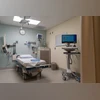The small and medium enterprise (SME) hospitals segment is expected to reach a market size of Rs 5 trillion by financial year 2026-27 (FY27), fuelled by localised demand, niche specialisation, and initiatives, according to a joint report by investment banking and consulting firm LoEstro Advisors and healthcare consulting firm Medium Healthcare.
The segment, however, faces sustainability pressures and competition concerns from large hospital chains despite accounting for 60 per cent of healthcare needs and 90 per cent of overall hospital beds in India.
Commenting on the state of SME hospitals, Rakesh Gupta, managing partner at LoEstro Advisors, said these institutions are the unsung heroes of Indian healthcare, especially in Tier-II and Tier-III cities. Yet, they operate with 40 per cent lower average revenue per occupied bed (ARPOB) compared to large chains, while managing longer patient stays and higher operational costs.
Furthermore, low profitability, extended average length of stay (ALOS), coupled with low occupancy rates and the expansion of larger hospital chains in smaller cities, is luring customers away from SME hospitals, impacting business performance.
“While fewer high-ticket procedures and charges have led to around 40 per cent less revenue per occupied bed in SME hospitals, their heavy focus on obstetrics and gynaecology has resulted in 33 per cent more ALOS than large private chains,” the report stated.
The report added that SMEs are also facing tiered competition from both large hospital chains and specialised local clinics that focus on one speciality.
“Large chains have added around 400 more centres beyond Tier-I cities over the last five years, with plans for more via brownfield expansions, whereas specialised local clinics are becoming a key alternative for middle-income groups,” the report added.
More From This Section
Ratan Jalan, managing director at Medium Healthcare, said the squeeze on SME hospitals from both premium chains and specialised clinics is not just a business challenge but a brewing healthcare access crisis.
“As large chains focus on metropolitan areas, SME hospitals remain crucial for delivering affordable care to millions of Indians who need quality healthcare in close proximity,” he added.
The report added that the SME hospitals sector can counter these challenges by introducing specialised units with high-revenue specialities like cardiology, while ensuring price optimisation through bundling of services.
“Specialities with higher contribution margins and ARPOB can significantly improve hospital profitability by maximising revenue per procedure and per bed, whereas establishing specialised centres of excellence can boost profitability,” it stated.
Similarly, the sector can also address these issues by improving staff training and focusing on accreditation to avail growth opportunities.
The report added that such improvements can result in higher patient satisfaction, thereby offering higher business growth.
)